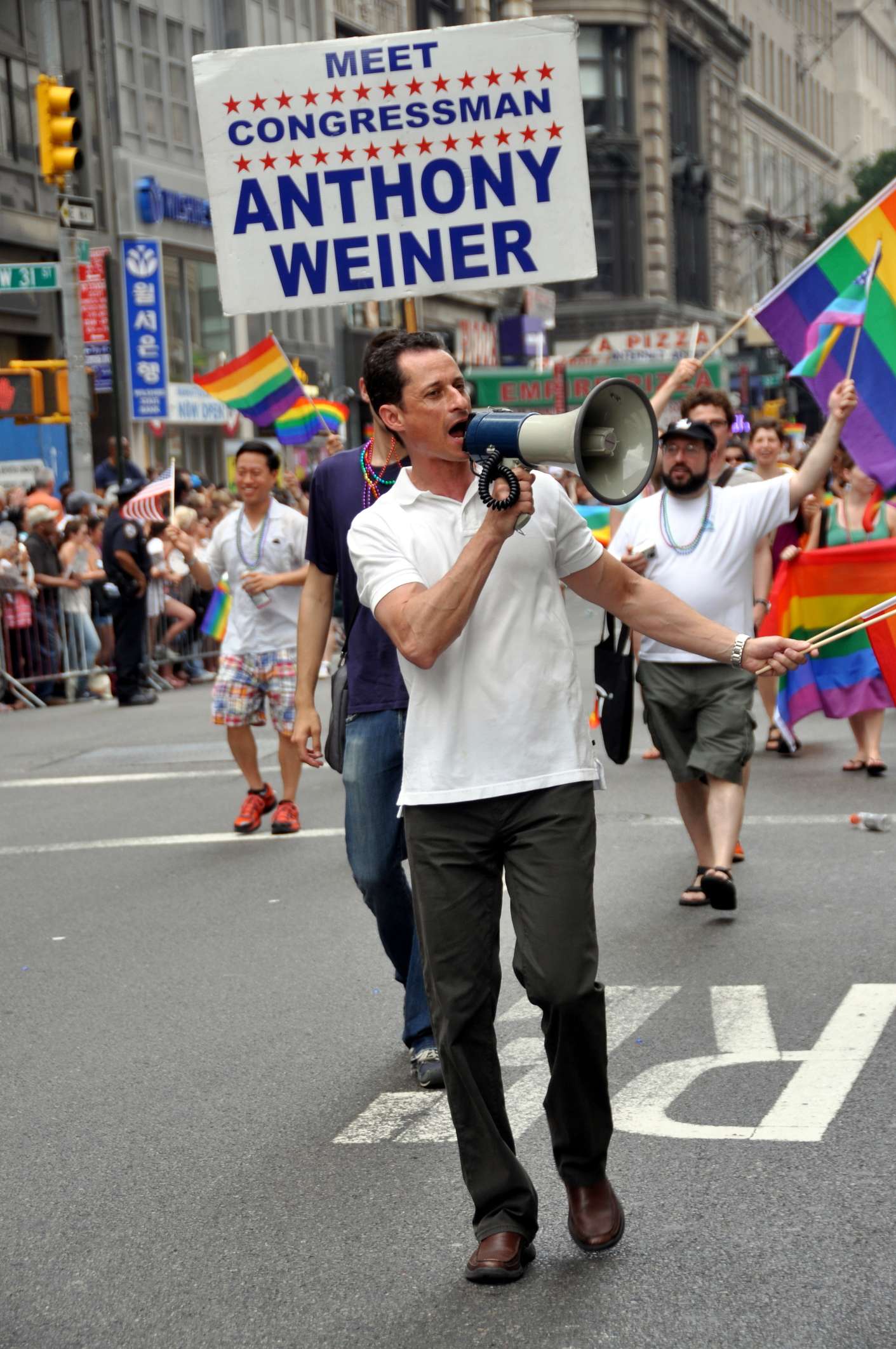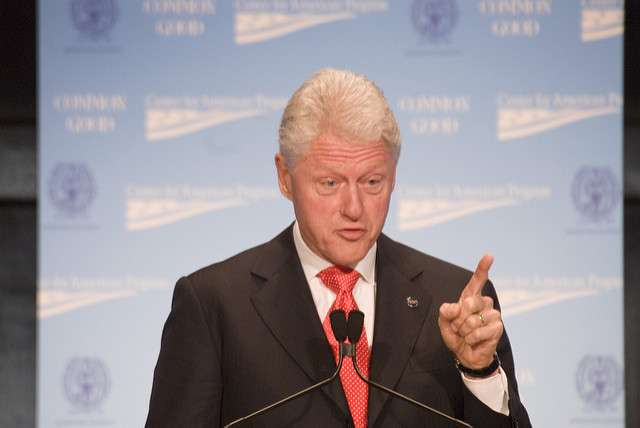Anthony Weiner's Sexting Is Dumb, But What Bill Clinton and His Aides Did to Inconvenient Women Is Vile
Weiner embarrassed himself and his wife, but Bill Clinton and his aides deliberately smeared Monica Lewinsky and other women's reputations.


Former Congressman Anthony Weiner (D-NY) has deleted his Twitter account after the New York Post revealed a third iteration of his "sexting" photos to an unnamed woman he appears to have never met in person. In one of the photos featuring a crotch shot, Weiner's toddler-aged son appears to be napping beside him in bed.
Weiner's latest and grossest peccadillo elicited predictable guffaws over social media, as well as incredulous musings on how Weiner's wife — Huma Abedin, a senior Hillary Clinton aide who frequently travels with the Democratic presidential nominee while Weiner tends to stay-at-home dad duties — could remain married to such a reckless cad.
It appears that she won't. In a statement released this morning, Abedin announced her intention to separate from Weiner. She also reportedly never gave her permission to appear in the critically acclaimed documentary Weiner, which includes several intimately private scenes of the couple in crisis during Weiner's second (of three and counting) sexting scandals.
Weiner has indeed humiliated himself and his wife repeatedly, and has also jeopardized Abedin's career as one of the closest confidantes of the person who could very well be the next president. He has also embarrassed his young son, whose innocent image is now and forever a part of Weiner's disgraced legacy.
But that's the limit of the fallout from Weiner's sexual compulsion. He has never been accused of sexual harassment or physical adultery, and once caught sending sexually suggestive photos he hasn't tried to deflect the blame to his sexting partners, even after they've exposed him publicly.
Still, a lot of the concern over the once-enduring Weiner-Abedin marriage has centered on how Weiner's digital philandering will affect Hillary Clinton's campaign for president. This is remarkable considering how little concern there is over Bill Clinton's behavior as president — and not just the well-worn tales of his many affairs or even the recently resurfaced rape accusation by Juanita Broaddrick — but the concerted effort by the president and White House officials to smear the reputations of inconvenient women.
The conservative offense taken over Clinton's dalliance with former White House intern Monica Lewinsky has long been framed by Clinton supporters as a kind of sexual puritanism or even "sexual McCarthyism." There's definitely something to that. Plenty of on the Right latched on to the admitted sex acts of the president in the Oval Office as an unforgivable moral sin.
But for many liberals (who ostensibly take sexual harassment in the workplace seriously) to discount the disparity of power between the leader of the free world and a 22-year-old intern, and instead choosing to frame Clinton's indiscretions as nothing more than an "affair" smacks of partisan hackery.
The ethical problems posed by a workplace sexual relationship are striking, but what's worse than the president of the United States seducing a wide-eyed volunteer was Bill Clinton's use of presidential power in an attempt to destroy her reputation after her existence became problematic for his presidency.
The late Christopher Hitchens testified in a sworn affidavit during Clinton's impeachment trial that White House senior adviser (and Hitchens' erstwhile friend) Sidney Blumenthal told him over lunch that Lewinsky was a "stalker" and that the president had been a "victim" of "a predatory and unstable sexually demanding young woman." Lewinsky wasn't the only woman in Clinton's past whose reputation Blumenthal took an interest in, according to what Hitchens later wrote of this conversation in Vanity Fair:
The preceding Sunday on 60 Minutes, Kathleen Willey had gone public with her accusation of a crude lunge made by Clinton, and what impressed me most at the time, and depressed me, too, was the tone of voice Sidney used in discussing this. "Yeah, her poll numbers are high now, but they'll be down by the end of the week. You'll see." There was a sort of "We'll take care of her" tone that I didn't like, and Carol [Hitchens' wife] and I couldn't look at each other. We felt the same constraint when he told us that "what people need to understand" was that Monica Lewinsky was a stalker, an unstable minx who had been threatening Clinton and telling him that if he didn't have sex with her she would say he had anyway.
Hitchens noted what should be patently obvious — that it is impossible for the President of the United States to be "stalked" in the Oval Office — and also quoted James Warren of the Chicago Tribune, who said on CNN at the time of the impeachment trial in 1999, "If I had a buck for every person at the White House who bad-mouthed [Lewinsky] to me last January I could leave the set now and head off to Antigua."

While political surrogates like Blumenthal naturally circle the wagons to protect their boss in a time of crisis, it's important to remember where the "stalker" slur to describe Lewinsky orginated. According to Blumenthal's testimony during Clinton's impeachment, it came from the "Big Dog" himself:
Q. What did the President tell you?
A. He, uh — he spoke, uh, fairly rapidly, as I recall, at that point and said that she had come on to him and made a demand for sex, that he had rebuffed her, turned her down, and that she, uh, threatened him. And, uh, he said that she said to him, uh, that she was called "the stalker'' by her peers and that she hated the term, and that she would claim that they had had an affair whether they had or they hadn't, and that she would tell people.
Q. Do you remember him also saying that the reason Monica Lewinsky would tell people that is because then she wouldn't be known by her peers as "the stalker'' anymore?
A. Yes, that's right.
Obviously, Clinton and Lewinsky did have a relationship of a sexual nature (even if the meaning of "sexual relations" will be parsed forevermore thanks to Clinton's legal wordplay), and his presidency survived impeachment — as he emerged from the trial more popular than ever — riding the public perception that the Republicans endangered the country while going on a pointless puritanical witch-hunt.
So the narrative had to change.
In a fawning two-part 2012 PBS documentary on the Clinton presidency, Ken Gormley — a law professor and the author of The Death of American Virtue: Clinton vs. Starr — said of the beginning of the Clinton-Lewinsky tryst, "There were almost these sparks flying between them from that first moment when they saw each other." This image of puppy love between a married 50-year-old commander-in-chief and a just-out-of-college intern doesn't sound much like the the account pushed by Clinton and Blumenthal — that Lewinsky was a femme fatale ensaring a hapless horny middle-aged everyman — and Clinton apologists shouldn't be allowed to have it both ways.
The Clinton-Lewinsky affair would have been the behind-closed-doors business of two consenting adults had it not taken place in a workplace (much less the most famous office space in the world). But the details matter, just as the fact that the elder, far more powerful participant in this relationship used the unmatched power of his office to try to shape public opinion by impugning a young woman's reputation matters.
Say what you want about Anthony Weiner, he's never been accused of doing anything even close to as unethical and abusive as Bill Clinton did.


Show Comments (170)